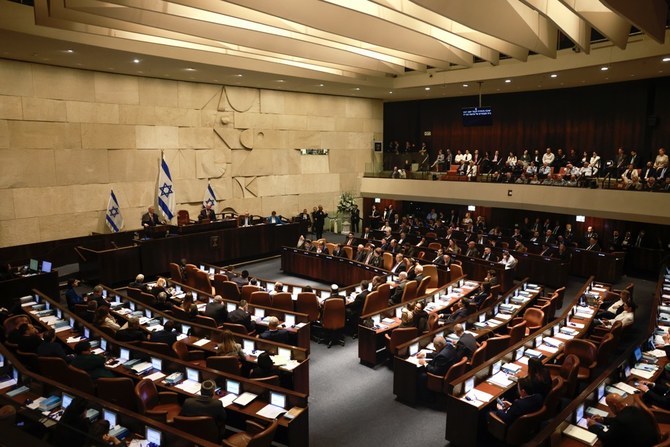Palestinian voices in Knesset in danger of being silenced

https://arab.news/vb64a
Benjamin Netanyahu’s latest coalition government has never looked at the Palestinian citizens of Israel as partners. In 2021, far-right Religious Zionism lawmaker Bezalel Smotrich, who is the finance minister in Netanyahu’s current Cabinet, addressed his Palestinian peers in the Knesset and said that David Ben-Gurion, Israel’s first prime minister, should have “finished the job” and expelled all Palestinians from the country when it was founded.
The Palestinian community within Israel has come a long way. With the Arab Joint List, Palestinian candidates presented themselves as a collective. Before that, they were spread among many different lists. They even participated in the Yair Lapid-Naftali Bennett government of 2021-22. Mansour Abbas, the head of the Joint List, was described as a kingmaker. In the close competition following the March 2021 election, Palestinians were able to define which camp emerged as the winner. This is something that definitely did not play in the favor of Netanyahu and his future far-right coalition.
Discrimination against Palestinian members of the Knesset is not new. They have always been looked at with suspicion, especially by the right, due to the affinity they generally have with their kinsmen in Gaza and the West Bank. As the mood in Israel is today turning more anti-Palestinian, Netanyahu could take this opportunity to sideline their representatives in the Knesset.
In 2016, three MKs from the Balad party, which is part of the Joint List, were suspended for attending a meeting with the families of Palestinians killed by Israeli forces. This pushed Netanyahu to put forward a bill to allow the suspension of Knesset members if 90 of the 120 lawmakers backed a vote on it. It was the first bill to give the Knesset the power to unseat representatives elected by the public. When the suspension law passed, civil rights groups warned that the legislation would be used to target Palestinians in the Knesset due to their limited presence compared to Jewish Israeli members.
This was not the first attempt to remove MKs of which the state does not approve. In 2002, the Palestinian politician Azmi Bishara and two colleagues were barred from the upcoming elections by the Central Elections Committee for supporting the Palestinian resistance against Israel’s occupation. The Supreme Court overturned the decision on appeal.
There have been other attempts to dilute the Palestinian voices within the Knesset. In 2013, the Constitution, Law and Justice Committee, headed by David Rotem of Likud, proposed a bill that would increase the threshold for parties to be represented in the Knesset from 2 percent of the votes in a national election to 4 percent. According to the Association for Civil Rights in Israel, this was mainly aimed at tempering the representation of minority groups like the Palestinian citizens of Israel and the Haredim. The legislation was set to increase the distortions in the country’s election results and boost the influence of medium and large parties at the expense of small parties, mainly representing the Palestinian minority. Ultimately, an increase to 3.25 percent was agreed and came into effect in 2014.
Eliminating Palestinian MKs would mean removing the minority that can make a moderate, pro-peace coalition victorious.
Dr. Dania Koleilat Khatib
Amnesty International issued a report in 2019, in which it found that Palestinian MKs are subject to discrimination that undermines their ability to defend the rights of the community they represent. Saleh Higazi, the organization’s deputy Middle East and North Africa director, said: “Palestinian members of the Knesset in Israel are increasingly facing discriminatory attacks. Despite being democratically elected like their Jewish Israeli counterparts, Palestinian MKs are the target of deep-rooted discrimination and undue restrictions that hamstring their ability to speak out in defense of the rights of the Palestinian people.”
Palestinian MK Aida Touma-Sliman, of the left-wing Hadash party, said she and her colleagues were subjected to “fascist filth” almost every day at the Knesset. Last November, she was suspended from the Knesset for two months for criticizing Israel’s post-Oct. 7 assault on Gaza. Touma-Sliman was punished for a social media post in which she condemned Israel’s attack on Al-Shifa Hospital. She denounced the “extreme right-wing government” and its suppression of critical voices in Israel.
In today’s mood of high tensions, differences are not tolerated. The Palestinian community is put under the microscope and any criticism of Israel’s actions is seen as incitement against the country and an act of sedition. Hence, many things that Netanyahu could not do prior to Oct. 7, he now can do. Netanyahu and his ilk were definitely very worried when the Joint List and its chairman were described as kingmakers. The last thing he wanted to see was an influential Palestinian community inside Israel.
So, Palestinian MKs are now being cornered and bogus accusations pushed against them in order to get them suspended from the Knesset. Ultimately, this goes beyond a few MKs being elected to the Knesset. It goes beyond allowing the Palestinian community within Israel to have a voice and be represented. Eliminating Palestinian MKs would mean removing the minority that can make a moderate, pro-peace, anti-Netanyahu coalition victorious. This should be of grave concern to the US, Europe and all Western allies of Israel who are keen that it remains a so-called democracy.
More importantly, this should be of great concern to those Israelis who now realize that the failed policies of Netanyahu led to Oct. 7. Rest assured, if the Palestinian members of the Knesset are removed from the political equation, Netanyahu will emerge victorious at the next elections.
• Dr. Dania Koleilat Khatib is a specialist in US-Arab relations with a focus on lobbying. She is co-founder of the Research Center for Cooperation and Peace Building, a Lebanese nongovernmental organization focused on Track II.









































